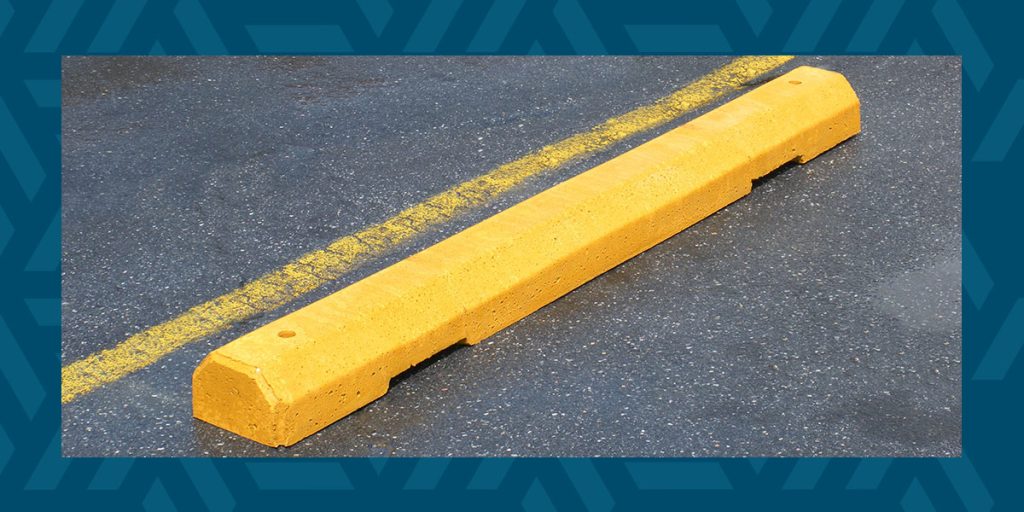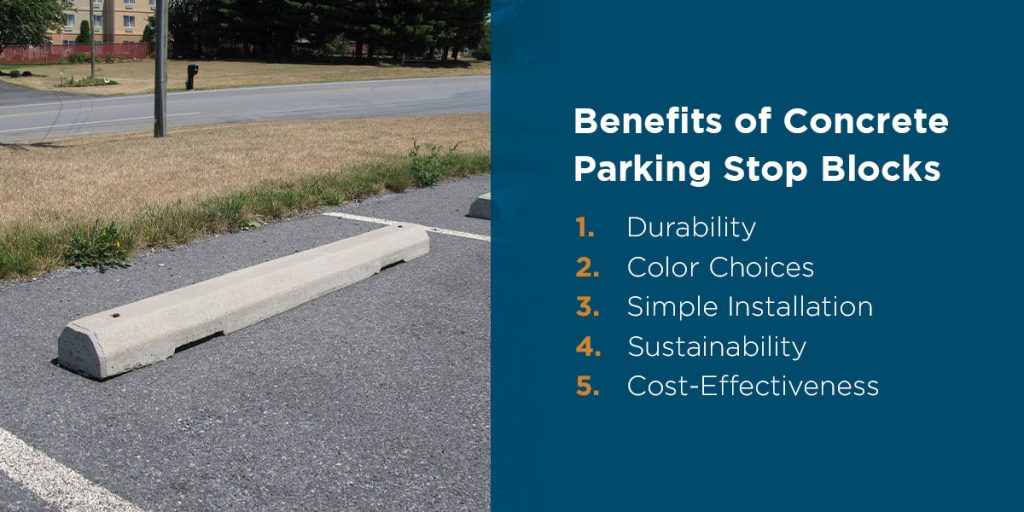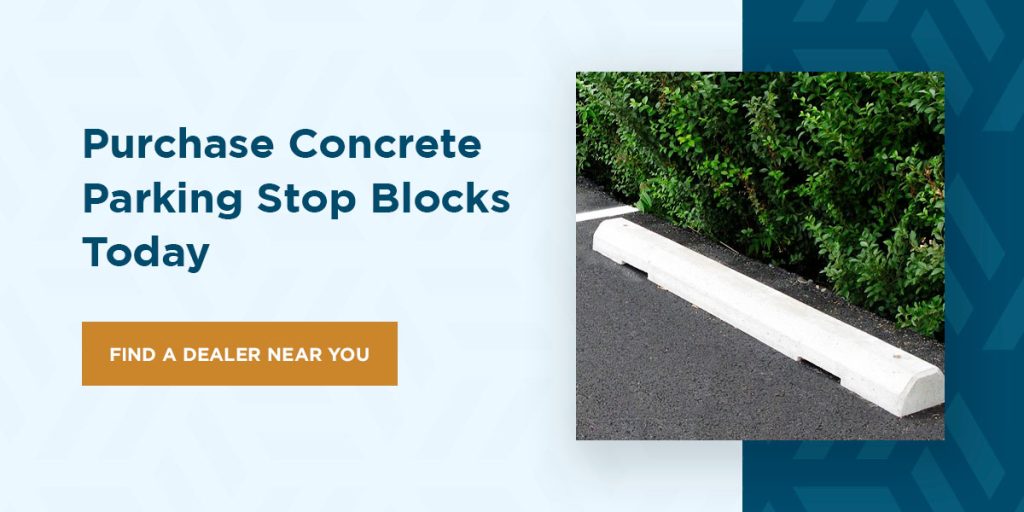
Also called a wheel stop or curb stop, a parking block is a small barrier at the head of a parking space. It assists drivers in parking their vehicles by ensuring they don’t drive beyond the designated space. The purpose of parking blocks is to keep drivers, passing pedestrians, vehicles and surrounding properties safe.
Parking blocks are typically made from concrete, rubber, metal or plastic. Concrete and rubber tend to be the most popular materials, as they’re the most economical and durable. While both can be practical choices for curb stops, it’s important to consider their pros and cons before selecting the right material for your parking lot.
Below, we’ll examine the advantages and disadvantages of concrete and rubber parking stop blocks.
Benefits of Concrete Parking Stop Blocks
First, let’s look at the pros of installing concrete wheel stops for your parking lot.
1. Durability
Concrete wheel stops are heavy and solid, making them incredibly strong and stable when secured into place. Naturally, they’re effective in preventing vehicles from coasting over parking spots. They can last for many years in both indoor and outdoor settings.
It’s important to note that excess water exposure can deteriorate concrete. Concrete is porous, so water can seep into the material and gradually weaken it. A weak concrete parking block is more susceptible to chipping and cracking from vehicle wheel impact.
Concrete parking blocks can be installed indoors or outdoors, regardless of the region or climate. Even if your concrete stoppers see some outdoor wear, they’re easy to repaint and repair.

2. Color Choices
You can paint and customize concrete parking blocks to designate different parking areas. Some examples include:
- Blue and white for handicapped parking.
- Yellow and black diagonal stripes for general parking.
- Red for reserved parking.
Keep in mind that paint can peel, chip and fade with prolonged exposure to natural elements. You’ll likely need to repaint concrete wheel stops periodically to maintain visibility.
Rubber parking blocks are typically precast with reflective tape or paint. This means that, unlike concrete blocks, they cannot be repainted. This can be a disadvantage if you want to change the color to reflect a specific type of parking area. You’ll likely have to replace the block with that of the appropriate color.
3. Simple Installation
Typically, concrete parking blocks come precast and ready to install. While installing each wheel stop may take two people since concrete is heavy, the process is relatively straightforward. The concrete block is placed on the desired site, then marked to correspond with the fixings.
Depending on the manufacturer’s instructions, these fixings can be metal bolts, galvanized pins, concrete epoxy or metal rebar. Installers drill holes into the pavement, then place the block on its correct setting. A significant benefit of concrete parking blocks is that they don’t budge easily once installed.
4. Sustainability
Concrete wheel stops don’t harm the environment, as they don’t contain any toxic elements. When a concrete parking block erodes over time, the particles simply turn to dust.
5. Cost-Effectiveness
Concrete parking blocks tend to be less expensive than rubber wheel stops. Rubber parking blocks are made from recycled tires, which makes processing and manufacturing more costly.
Benefits of Rubber Parking Stop Blocks
Next, we’ll cover some benefits of choosing rubber wheel stops for your parking lot.
1. Durability
Rubber parking blocks can hold up relatively well in indoor and outdoor conditions. They’re resistant to water and moisture, making them ideal for outdoor parking facilities. Additionally, rubber wheel stops typically won’t crack or chip with repeated wheel contact.
However, rubber parking blocks aren’t entirely sunlight resistant. Since rubber is inherently malleable, it’s prone to warping, softening and melting with frequent UV exposure. That being said, you may want to reconsider rubber wheel stops if you live in a particularly warm region.
2. Easy Installation
Rubber wheel stops are usually lighter than their concrete counterparts, making them relatively easier to move, maneuver and install. Fixings and installation requirements can vary depending on the manufacturer. In most cases, however, only one person is needed to install a rubber parking block due to its light weight.
Should I Choose Concrete or Rubber Parking Blocks?
Both materials have their benefits, but we recommend concrete parking blocks for most installations. While they’re heavier, they’re also more likely to remain secure and stable. Additionally, concrete wheel stops are constructed from organic material that can last many years — regardless of your location, climate, or indoor or outdoor parking facility.
Rubber parking blocks are less likely to crack or chip. However, you can’t repaint them, meaning there are limited repair options once they start showing signs of wear. Concrete wheel stops can be repaired and repainted for a fresh look. Concrete parking blocks will usually maintain function and appearance for longer.
Concrete Parking Stop Options From Nitterhouse Masonry
Nitterhouse Masonry is a leading producer of quality concrete parking blocks. Family-owned and operated for five generations, our extensive dealer network provides clients throughout the Eastern United States with high-performing concrete stoppers. We have various options to choose from, including:
- Concrete: Our traditional concrete curb stops are a quick, simple and durable solution for parking lots.
- Concrete log: Resembling trees, our concrete log curb stops can easily blend in with your parking lot’s natural surroundings. They’re a visually pleasing option providing long-term performance and durability.
- Bright yellow concrete: Our bright yellow concrete parking stops offer maximum visibility, clearly outlining your parking lot’s structure.
Manufactured with 5,500-psi concrete, our precast parking lot stops provide excellent UV resistance. They include pins for stable installation and won’t twist or warp over time. Our concrete stoppers can withstand even the harshest weather conditions.
Besides durability, our concrete parking stops are designed with the utmost safety in mind. They help direct traffic flow and defend surrounding infrastructure and pedestrians from rolling vehicles. We mold each block to reduce pressure on the block’s anchor pins, vehicle tires and tire strike surfaces. Regardless of your location and unique parking lot structure, our concrete parking stops can deliver the safe solution you need.
The block incorporates a sloped design to protect tires from dents, tears and punctures. Our concrete stoppers can also defend signage, carts, poles, parked cars and other surrounding elements from damage. Once you’ve selected and ordered your concrete stoppers, we can also come to your site and install them for you!

Purchase Concrete Parking Stop Blocks Today
Whether your parking lot is near a school, sidewalk, shopping center or another facility, you can protect surrounding infrastructure and people from rolling vehicles with our concrete parking blocks. Regardless of the type you choose, you can always count on Nitterhouse Masonry for reliable, long-lasting products. Find a dealer near you to order your concrete parking blocks!


